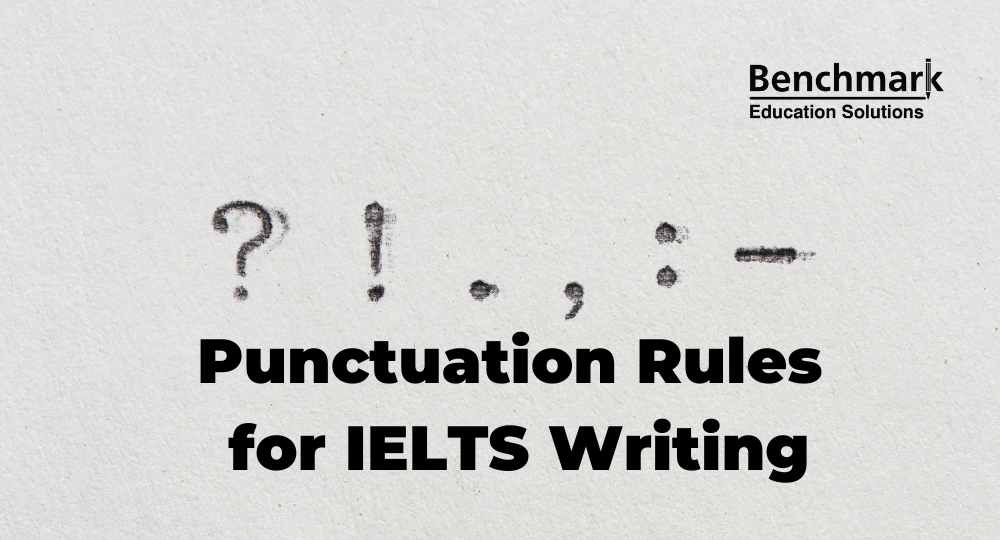Mastering Punctuation Rules in IELTS Grammar
- 0 Comments


Learn the punctuation rules for IELTS writing for a high band score. Accurate use of punctuation in IELTS is crucial for grammatical range and accuracy.
Table of Contents
1. Punctuation Rules for IELTS Writing
Mastering the rules of punctuation for IELTS writing is key to elevating your band score. Punctuating your sentences correctly will not only count in your favour grammatically, but it’ll also enhance the accuracy and coherence of your writing.
1.1 Full stop (.)
It is probably the most common punctuation. Full stops are used to mark the end of a statement.
Use:
- At the end of a sentence.
I noticed an issue that requires your attention.
1.2 Comma (,)
The comma is an essential form of punctuation, but can easily be overused. For this reason, it’s important that you familiarise yourself with the rules to be able to incorporate them correctly.
Commas also play a part in the clarity and overall understanding of an essay.
Use:
- When listing items.
Example: I would like to thank you for your advice, guidance and contribution to the project.
- To separate independent clauses.
Example: I’d like to invite you to my birthday party, but I know you already have other commitments.
- To enclose unimportant information with relative pronouns.
Example: The project, which we have been working on for months, has been completed.
- In letters after greetings and when signing off.
Example: Dear Peter, / Best wishes, Mark
- After linking words or phrases,.
Example: Furthermore, population growth would be affected significantly.
- To separate adjectives that describe the same noun.
Example: The graph shows a sudden, dramatic increase in graduating students.
- After adverbial phrases. These phrases are placed at the beginning of a sentence to give more information on place, time, manner, and frequency.
Example: In rural areas, the number of students enrolling in university is significantly lower.
1.3 Semicolon (;)
It’s a crucial form of punctuation to improve readability and enhance clarity in your writing tasks. Use of a semicolon is not highly advised as one can easily for grammatically accurate sentences without a semicolon as well.
Use:
- To separate two independent clauses. It can replace coordinating conjunctions in a sentence.
Example: The government should invest more in renewable energy sources; this would help fight against global warming.
- When separating items in more complicated lists.
Example: The cities that could be affected by this change are Sydney, Australia; Berlin, Germany; Cape Town, South Africa; and California, America.
1.4 Colon (:)
Use:
- To introduce a list.
Example: Some examples of renewable energy include: solar power, wind energy, and hydropower
- To introduce quotations.
Example: As stated by Dr. Smith: “Sustainable practices are essential for preserving our environment.”
- Emphasise explanations or examples.
Example: The government’s initiatives aim to achieve two main goals: reduce carbon emissions and promote renewable energy sources.
1.5 Exclamation mark (!)
You’ll most likely only make use of this punctuation in an informal letter.
Use:
- To express a strong emotion
Example: I received wonderful news yesterday!
1.6 Question mark (?)
This might seem simple and easy to use. But be cautious not to use it after an imperative sentence, like “Please close the door.” At the same time, many IELTS candidates tend to write interrogative sentences in their essays. Though this approach is not wrong, it is still not advisable.
Use:
- After a direct, indirect, and rhetorical question.
Example: Would you mind rescheduling our meeting to a later time?
2. Common Punctuation Mistake: Comma-Splice
This occurs when the comma gets overused in writing. It leads to unclear writing as it disrupts the flow of ideas. The best way to avoid comma-splice errors is to:
- Make use of conjunctions.
- Separate ideas by accurately using the full stop.
- Use a semi-colon to join independent clauses.
Incorrect:
The experiment they conducted was successful, a lot of people participated in it.
Correct:
The experiment they conducted was successful; a lot of people participated in the experiment.
The experiment they conducted was successful, since a lot of people participated in it.










